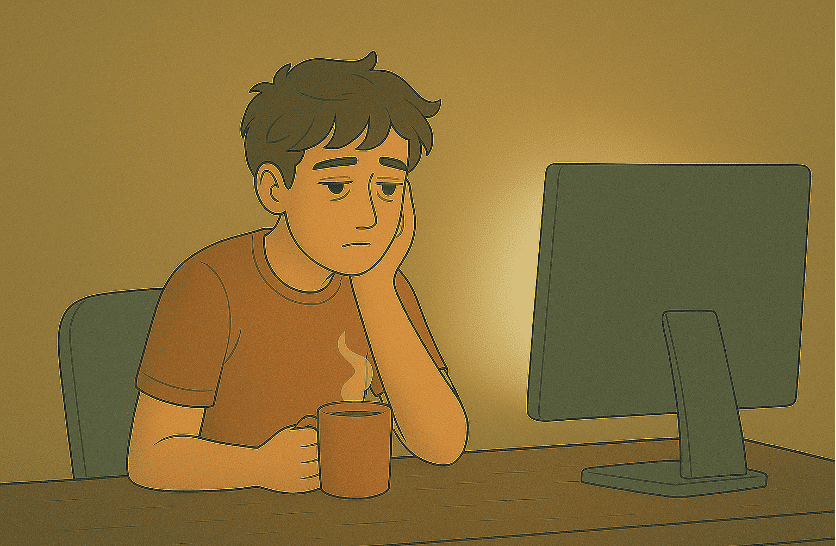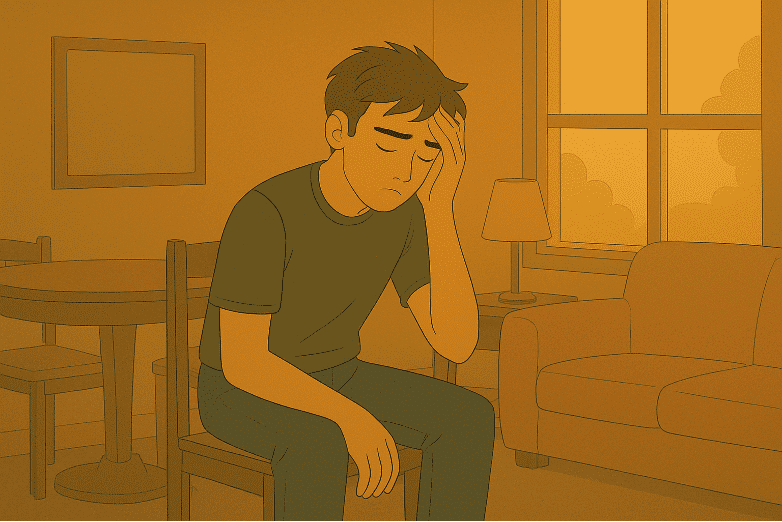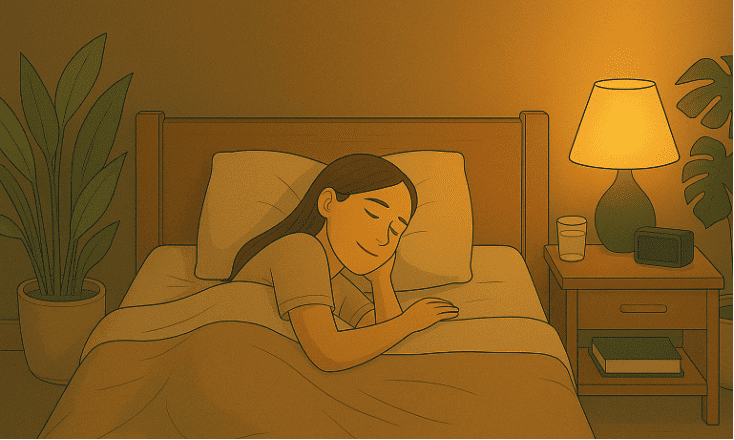
Key Takeaways
- Sleep is the foundation of emotional and cognitive health, helping regulate mood, process emotions, and reduce the risk of developing anxiety or depression.
- Deep and REM sleep play essential roles in emotional recovery and brain maintenance, clearing toxins, balancing hormones, and helping the mind process stress.
- Consistent, high-quality sleep strengthens focus, resilience, and emotional stability, making it one of the simplest ways to support long-term mental health.
- Chronic sleep deprivation disrupts mood regulation, increases stress reactivity, and worsens existing psychological symptoms, making recovery more difficult.
- True wellness comes from combining good sleep with professional support. Mission Connection offers flexible, compassionate care to help you restore balance and emotional strength.
The Sleep-Mental Health Connection: Why Quality Rest Matters
Your brain doesn’t simply switch off during sleep. It goes through essential processes that support mental health, like consolidating memories, processing emotions, and clearing metabolic waste. This is why a single bad night can leave you irritable and foggy, while chronic sleep deprivation can increase the risk of serious mental health conditions.
- Sleep affects your ability to regulate emotions
- Poor sleep amplifies negative thinking
- Sleep quality influences stress hormone levels
- Rapid Eye Movement (REM) sleep helps process emotional experiences
- Consistent sleep schedules regulate mood-related neurotransmitters
Research shows that people with insomnia have a significantly higher risk of developing depression, anxiety, and psychosis, highlighting the importance of addressing sleep disturbances for mental health. Sleep improvements are now even part of treatment plans for some mental health disorders.
Mission Connection offers flexible outpatient care for adults needing more than weekly therapy. Our in-person and telehealth programs include individual, group, and experiential therapy, along with psychiatric care and medication management.
We treat anxiety, depression, trauma, and bipolar disorder using evidence-based approaches like CBT, DBT, mindfulness, and trauma-focused therapies. Designed to fit into daily life, our services provide consistent support without requiring residential care.
How Your Brain Heals During Sleep
Sleep supports mental health through essential biological processes that help maintain emotional resilience and cognitive function.
Brain Waste Removal During Deep Sleep
During deep (slow-wave) sleep, the brain’s glymphatic system clears toxic proteins like beta-amyloid, which are linked to cognitive decline, mood disorders, and anxiety. Brain cells shrink, creating space for cerebrospinal fluid to flush away waste, keeping your brain functioning optimally.
Emotional Processing in REM Sleep
REM sleep acts as overnight therapy. Emotional centers are active while logical areas rest, helping process difficult experiences and consolidate positive ones. Stress-related chemicals like norepinephrine are suppressed, promoting emotional healing.
Hormone Regulation and Mood Balance
Sleep regulates serotonin, dopamine, and cortisol. Without adequate rest, cortisol remains high, increasing anxiety and reducing emotional resilience. Poor sleep can raise cortisol levels, highlighting the critical role of sleep in mental health.

10 Powerful Mental Health Benefits of Quality Sleep
Consistently getting high-quality sleep enhances mental health in meaningful ways, creating a positive cycle that improves emotional stability, cognitive function, decision-making, and overall life satisfaction. Prioritizing sleep is one of the simplest, most effective strategies for supporting psychological well-being.
1. Reduced Anxiety and Stress
Sleep helps regulate the amygdala, lowering overreactions to stress and emotional triggers. Restorative sleep reduces hyperarousal, allowing your nervous system to reset. Over time, consistent sleep improves coping skills, emotional resilience, and your ability to stay calm under pressure.
2. Lower Risk of Depression
Good sleep breaks the cycle between insomnia and depression. Adequate rest supports mood regulation, strengthens positive thought patterns, and reduces vulnerability to depressive episodes. Prioritizing sleep can complement therapy and other interventions for long-term mental wellness.
3. Enhanced Emotional Regulation
Adequate sleep strengthens connections between emotional and rational brain centers, allowing you to respond thoughtfully rather than react impulsively. This balance improves patience, perspective, and emotional intelligence, which is especially valuable in relationships, caregiving, and high-stress work environments.
4. Improved Memory and Cognitive Function
Sleep consolidates memories, strengthens learning, and processes emotions. Well-rested brains recall experiences more accurately, make better connections, and maintain a coherent sense of self. This clarity supports decision-making, problem-solving, and emotional awareness.
5. Better Decision-Making
Quality sleep optimizes executive functions like planning, focus, and judgment. Rested individuals make thoughtful choices, manage multiple tasks efficiently, and reduce impulsive behaviors, positively impacting personal, professional, and social life.
6. Increased Focus and Concentration
Restorative sleep enhances attention, enabling you to filter distractions, maintain mental clarity, and prevent rumination. Improved focus supports productivity, learning, and emotional stability throughout the day.
7. Boosted Creativity and Problem-Solving
REM sleep strengthens neural connections, fostering creative thinking and innovative problem-solving. This cognitive flexibility also promotes emotional adaptability, helping you process challenges with new perspectives and resilience.
8. Greater Resilience to Daily Challenges
Well-rested individuals handle stress more effectively, staying composed during difficulties. Each night of good sleep strengthens your emotional buffer, prevents burnout, and builds long-term psychological endurance.
9. Reduced Risk of Mental Health Disorders
Consistent sleep acts as a protective factor against depression, anxiety, and PTSD. It can influence genetic predispositions, modulate stress responses, and support overall emotional stability.
10. Stronger Relationship Satisfaction
Good sleep improves empathy, communication, and patience, enhancing social interactions and relationship quality. Well-rested individuals can respond thoughtfully in conflicts, foster intimacy, and maintain supportive social networks that reinforce mental well-being.
The Consequences of Sleep Deprivation on Mental Health
Consistently inadequate sleep triggers a cascade of effects on the brain and body, directly impacting mental well-being and often worsening psychological distress.
Increased Irritability and Mood Swings
Even a single night of poor sleep can leave you irritable, while chronic deprivation amplifies emotional reactivity due to hyperactivity in the amygdala. Mood swings can strain relationships, reducing social support and creating a cycle that further harms mental health.
Heightened Stress Response
Sleep deprivation increases stress hormones, keeping the body in a state of hyperarousal. This heightened state makes everyday stressors feel overwhelming and can gradually alter brain regions responsible for emotional regulation and stress management.
Worsening Existing Mental Health Conditions
For those managing mental health conditions, sleep disruption can trigger symptom flare-ups. Poor sleep particularly affects mood regulation, intensifying symptoms in disorders like bipolar disorder, depression, and PTSD. Addressing sleep is therefore a critical part of overall mental health care.
How Much Sleep Do You Need for Mental Wellness?
Sleep needs vary between individuals, but research provides clear guidelines for the amount that best supports mental health. Adequate sleep ensures complete cycling through all sleep stages, providing essential benefits for emotional processing and cognitive restoration.
Age-Based Sleep Recommendations
An expert panel provided sleep duration guidelines across nine age groups, categorizing hours of sleep per day as “recommended,” “possibly appropriate,” or “not recommended.” Recommended sleep ranges include 14–17 hours for newborns, 12–15 hours for infants, 11–14 hours for toddlers, 10–13 hours for preschoolers, 9–11 hours for school-aged children, and 8–10 hours for teenagers. For young adults and adults, 7–9 hours is advised, while older adults are recommended 7–8 hours. These recommendations are based on scientific evidence, expert discussion, and consideration of optimal health and developmental needs.
Individual Variations
Sleep requirements can differ based on genetics, activity, and health. The best measure is how you feel during the day: mental clarity, emotional stability, and sustained energy indicate sufficient rest. Some people naturally need slightly less or more than recommended, but truly healthy short sleepers are rare. Monitoring mood, focus, and emotional responses can help determine if your sleep meets your personal needs.
5 Practical Steps to Improve Sleep Quality

Improving sleep doesn’t require complicated interventions, simple, consistent habits can significantly enhance both sleep quality and mental health.
1. Create a Sleep-Friendly Environment
Keep your bedroom cool, dark, and quiet. Blackout curtains, white noise machines, or earplugs can help create optimal conditions. A supportive mattress and pillows reduce discomfort and nighttime awakenings, allowing your brain to cycle fully through deep and REM sleep, which supports emotional processing and cognitive restoration.
2. Establish a Consistent Sleep Schedule
Go to bed and wake up at the same time each day, even on weekends. A calming pre-sleep routine, like reading, gentle stretching, or a warm bath, signals your brain to relax, helping you fall asleep faster and enjoy more restorative sleep. Consistency reinforces your circadian rhythm, improving mood regulation and mental clarity.
3. Limit Screen Time Before Bed
Blue light from phones, tablets, and TVs suppresses melatonin, delaying sleep and reducing REM sleep. If avoiding screens entirely isn’t possible, use night mode, blue light blocking glasses, or set a technology curfew to protect sleep quality and support emotional well-being.
4. Watch Your Diet and Exercise Habits
Avoid caffeine in the afternoon and limit alcohol before bed, as both disrupt sleep cycles and emotional processing. Regular physical activity promotes deeper sleep, reduces stress, and enhances overall mental resilience.
5. Try Relaxation Techniques
Mind-body practices like deep breathing, meditation, or progressive muscle relaxation activate your body’s “rest and digest” mode, helping reduce anxiety, fall asleep faster, and improve deep sleep for stronger mental health benefits.
When Sleep Problems Signal Mental Health Issues
Sleep difficulties can both cause and signal underlying mental health conditions. Understanding this connection helps identify when sleep changes may indicate developing psychological concerns that require professional attention. Early recognition allows for more effective intervention.
Common Sleep Disorders Linked to Mental Health
Insomnia, especially early morning awakening, often correlates with depression. Excessive daytime sleepiness despite adequate rest may indicate depression or anxiety. Frequent nightmares or night terrors can accompany post-traumatic stress disorder, serving as key diagnostic clues.
When to Seek Professional Help
If sleep problems persist despite good sleep hygiene, or if they cause daytime impairment or mood disturbances, it’s important to consult a healthcare provider. These patterns may signal underlying conditions needing targeted treatment.
Therapies That Help
Addressing sleep and mental health together is often most effective. Cognitive behavioral therapy for insomnia (CBT-I) improves sleep and also reduces symptoms of depression and anxiety. Integrative approaches that combine therapy, lifestyle adjustments, and mental health support treat sleep and psychological well-being as interconnected, boosting overall outcomes.
Supporting Mental Health Through Mission Connection
Prioritizing quality sleep is a vital part of maintaining emotional balance, but for many, true mental wellness also requires professional support. Mission Connection provides accessible, compassionate outpatient care designed to meet you where you are in your journey.

Flexible, Accessible Care Options
Mission Connection understands that life can be demanding. That’s why they offer flexible treatment formats, in-person, virtual, and hybrid, so you can receive care that fits your schedule. If you’re a student, professional, or caregiver, therapy is available when and how you need it most.
Comprehensive, Evidence-Based Treatment
Their multidisciplinary team of licensed clinicians delivers individualized therapy plans using proven methods like CBT, Dialectical Behavioral Therapy (DBT), Eye Movement Desensitization and Reprocessing (EMDR), and Emotion-Focused Therapy (EFT). In addition to individual and group therapy, clients can access psychiatric evaluations, medication management, and psychoeducation for a truly integrated approach to healing.
Empowering Long-Term Wellness
Mission Connection focuses on building lifelong skills for emotional regulation, resilience, and mental stability. Many clients report improved mood, stronger coping abilities, and greater self-awareness after completing treatment, results that complement the mental health benefits of consistent, restorative sleep.
Begin Your Journey to Healing
If you’re ready to take the next step toward balanced mental health, Mission Connection is here to guide you. Visit our website to learn more about programs, verify insurance coverage, and begin your personalized therapy plan today.
Call Today 866-833-1822.
Frequently Asked Questions (FAQs)
Can poor sleep cause anxiety?
Yes, poor sleep can trigger or worsen anxiety by overactivating the amygdala and reducing prefrontal cortex regulation, creating hyperarousal. Even a single night of insufficient rest can increase anxiety and heighten emotional reactivity.
How quickly does sleep deprivation affect mental health?
Mental health impacts begin after just one night of poor sleep, causing irritability, heightened stress sensitivity, and difficulty concentrating. Continued sleep loss can intensify mood disturbances and emotional dysregulation within a few consecutive nights.
Is napping beneficial for mental health?
Short naps (20–30 minutes) refresh cognition and mood without disrupting nighttime sleep, while longer naps including REM support emotional processing. Afternoon naps are best, supplementing rather than replacing quality nighttime sleep.
What sleep position is best for mental health?
Side sleeping may support brain waste clearance, reduce snoring, and improve sleep quality. Back sleeping helps with reflux, while stomach sleeping is less recommended. Comfort and uninterrupted sleep are more important than position alone.
Can improving sleep reduce medication needs for mental health conditions?
Enhancing sleep quality through therapies like CBT-I can improve treatment response and, in some cases, reduce medication dosages for depression or anxiety. Mission Connection offers personalized therapy programs that integrate sleep-focused interventions with comprehensive mental health care, helping clients improve sleep while supporting overall treatment. Sleep improvements should always complement, not replace, prescribed medications under professional guidance.



